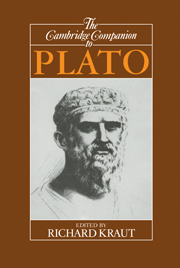Book contents
- Frontmatter
- 1 Introduction to the study of Plato
- 2 Plato
- 3 Stylometry and chronology
- 4 Socrates and the early dialogues
- 5 Mathematical method and philosophical truth
- 6 Inquiry in the Meno
- 7 Plato and Greek religion
- 8 Platonic love
- 9 Plato's metaphysical epistemology
- 10 The defense of justice in Plato's Republic
- 11 Plato on poetic creativity
- 12 Good-bye to the Third Man
- 13 Plato's Sophist on false statements
- 14 Disintegration and restoration
- 15 Plato's later political thought
- Bibliography
- Index
7 - Plato and Greek religion
Published online by Cambridge University Press: 28 May 2006
- Frontmatter
- 1 Introduction to the study of Plato
- 2 Plato
- 3 Stylometry and chronology
- 4 Socrates and the early dialogues
- 5 Mathematical method and philosophical truth
- 6 Inquiry in the Meno
- 7 Plato and Greek religion
- 8 Platonic love
- 9 Plato's metaphysical epistemology
- 10 The defense of justice in Plato's Republic
- 11 Plato on poetic creativity
- 12 Good-bye to the Third Man
- 13 Plato's Sophist on false statements
- 14 Disintegration and restoration
- 15 Plato's later political thought
- Bibliography
- Index
Summary
Religion permeated life in classical Athens and in classical Greece generally. It is hardly surprising, then, that religious vocabulary - mention of gods, festivals, beliefs, and rites - also pervades Plato's dialogues. These dialogues reveal a man struggling to understand human life and how it ought to be lived, a man engaged in deep reflection about rational inquiry, the human roles in society and in the cosmos, and man's relationship to the divine. Religion, as rite, conception, motif, and vocabulary, is integral to his thinking. By showing how this is so we can illuminate Plato's thinking from the religious side, as it were, and thereby exhibit Plato's relationship to Greek religion and piety.
It is hard to exaggerate the prominence of religion in Greek life. Greek religion was pluralistic and heterogeneous,- there was a host of divinities with overlapping roles and features. A dozen gods formed the conventional core of this pantheon (Zeus, Hera, Poseidon, Athena, Apollo, Artemis, Aphrodite, Hermes, Demeter, Dionysos, Hephaistos, Ares); broadly conceived as Zeus's family, these, and lesser divinities such as the goat-god Pan, are the Olympians, so called after Mount Olympus, site of Zeus's palace. They and other gods, such as Hades and Persephone, were themselves varied and multiple, each present at dozens of places in various guises, serving a variety of purposes and roles. Zeus, for example, manifest as a thunderbolt, was the strongest of the gods and the father of gods and men.
- Type
- Chapter
- Information
- The Cambridge Companion to Plato , pp. 227 - 247Publisher: Cambridge University PressPrint publication year: 1992
- 7
- Cited by



